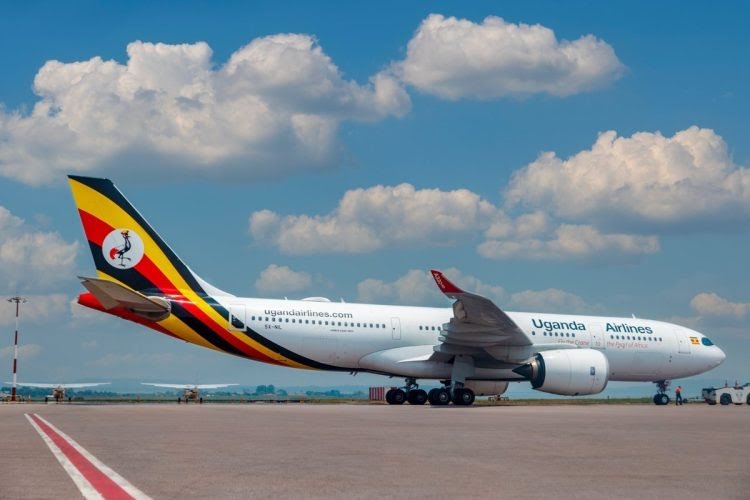
KAMPALA – Uganda Airlines is facing a storm of fresh scrutiny and public distrust after its flagship Airbus A330-800neo was grounded for a week at London’s Gatwick Airport, an incident that stranded passengers and revealed profound operational vulnerabilities within the state-owned carrier.
The aircraft’s prolonged immobilization sparked initial speculation that it had been impounded by authorities over unpaid taxes. For days, airline officials remained evasive, describing the issue only as a “technical” matter and citing the sensitivity of aviation issues.
However, Uganda Airlines CEO Jennifer Bamuturaki has since confirmed that the cause was surprisingly mundane: a flat tyre. Or rather, two.
In an attempt to quell the rumours, Bamuturaki stated, “It’s not true that it was failure to pay taxes. That’s malicious and uncalled for.” She explained that the unique nature of the aircraft created a logistical nightmare, with suppliers unable to provide immediate support. “We received six quotes for the same serial number. So we made a decision to deliver the tyres from Uganda, and they arrived last night on KQ [Kenya Airways]. The aircraft was repaired and is back in service.”
A Minor Issue, A Major Crisis
Despite the CEO’s assurances, the episode has backfired, deepening concerns over the airline’s fragility. Aviation analysts and the public are questioning how a simple flat tyre could cripple a modern, flagship jet for seven days, forcing passengers to either abandon their tickets or pay out of pocket to fly with rival carriers like RwandAir.
The incident highlights a critical lack of preparedness and robust maintenance planning, turning a minor technical hiccup into an international embarrassment and a commercial gift to competitors.
A Pattern of Mismanagement
The Gatwick fiasco comes at a damaging time for the airline, following a damning report from the Auditor General that exposed massive financial leakages totaling over Shs 165 billion (approximately $43 million) over the past three years.
The audit paints a picture of an airline haemorrhaging money due to weak internal controls and poor oversight. Key findings include:
· Fuel Mismanagement: Shs 41 billion lost in undocumented payments, overbilling, and questionable penalties with supplier MixJet.
· Ticketing Fraud: Shs 3.5 billion was refunded for tickets that had already been used by passengers.
· Vanished Sales: A staggering Shs 103 billion in ticket revenue was recorded in the booking system but never made it to the company’s bank accounts.
· Revenue Misreporting: Shs 5.3 billion in service fees were wrongly classified as taxes and collected without Board approval.
Mounting Distrust
For an airline that relies heavily on taxpayer bailouts, each new scandal erodes its already fragile reputation. The London grounding underscores how quickly any problem—whether a flat tyre or a financial scandal—can escalate, damaging international confidence.
While the company insists the London incident was purely technical, the week-long ordeal raises fundamental questions about its crisis management capabilities. For travellers, the message is becoming increasingly clear: until Uganda Airlines fixes its finances and its operational resilience, it risks being better known for grounded planes and missing billions than for reliable service in the skies.









